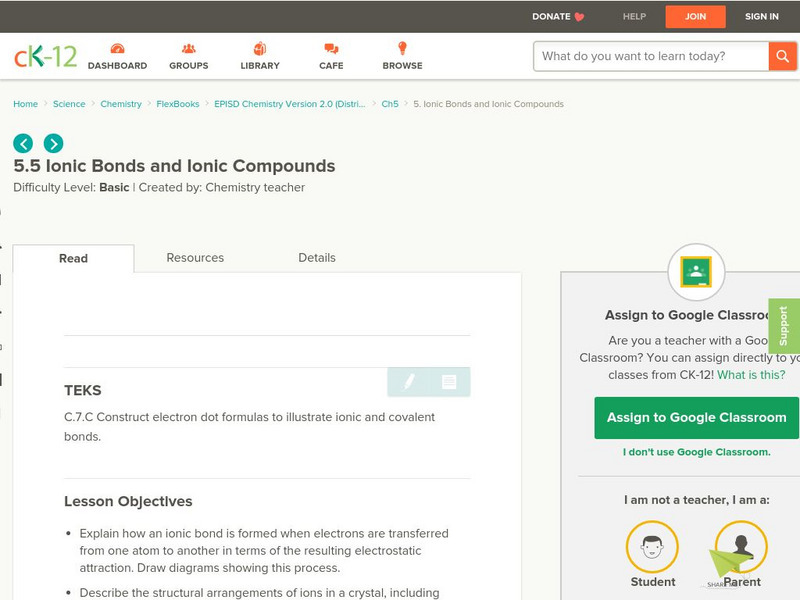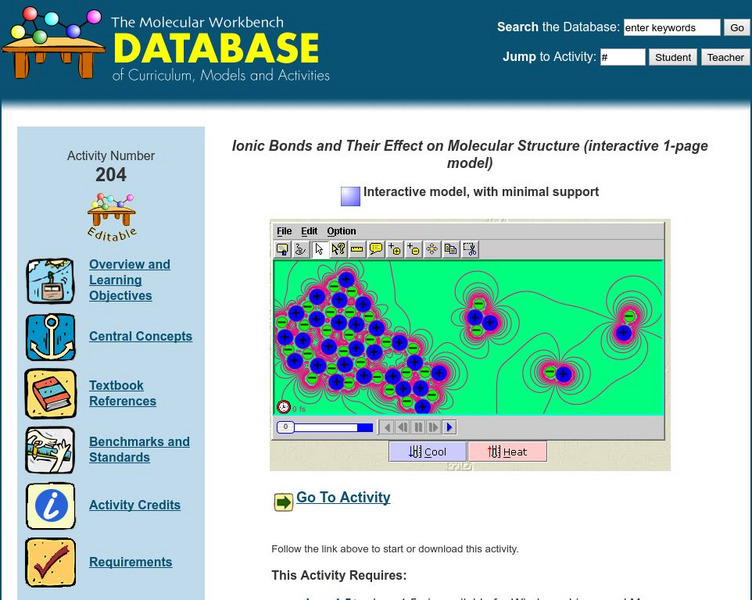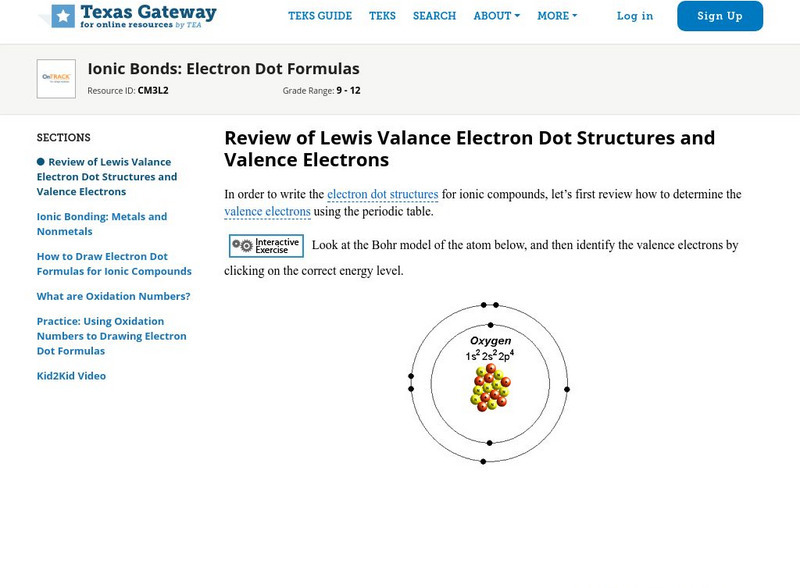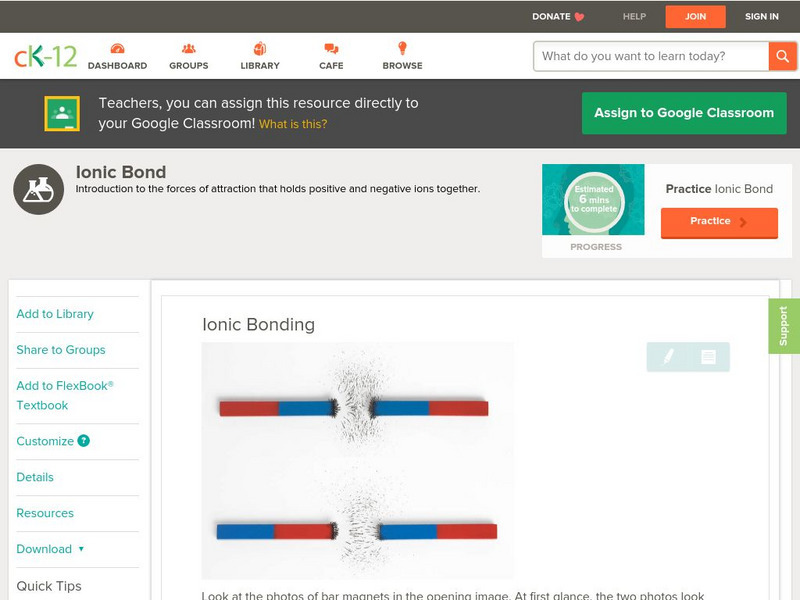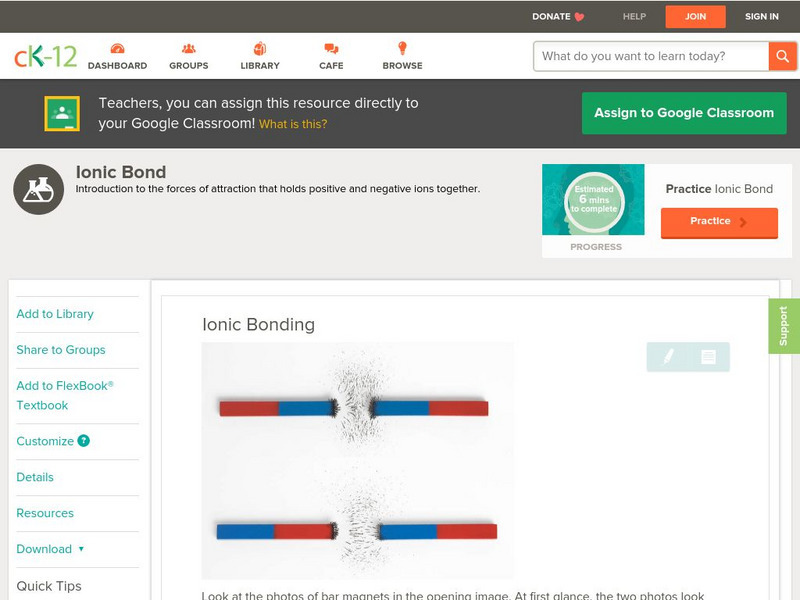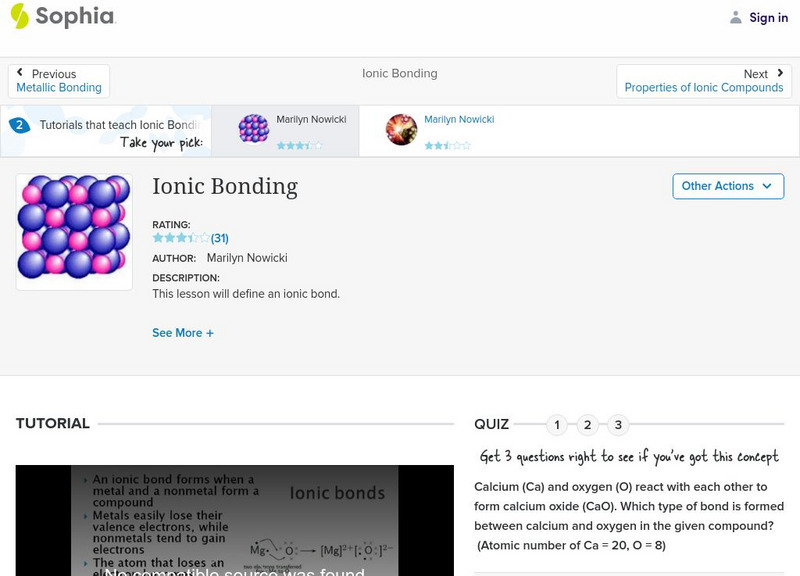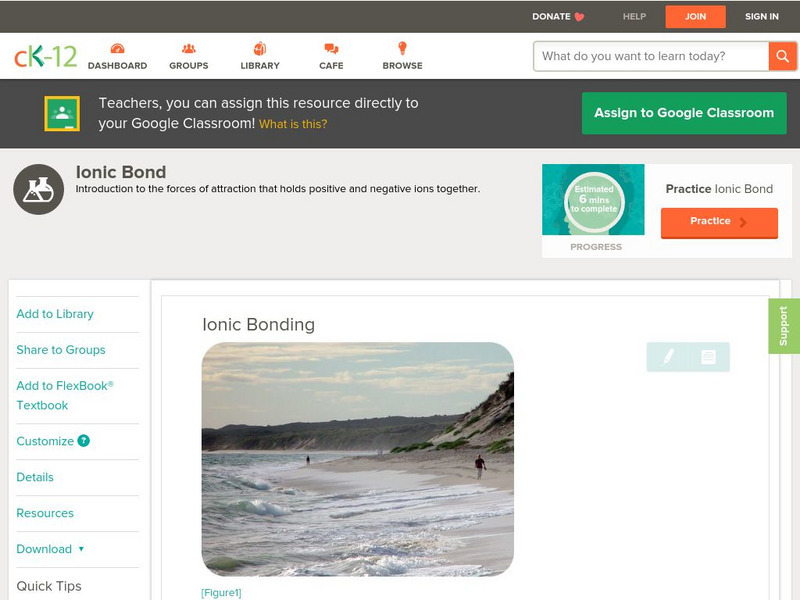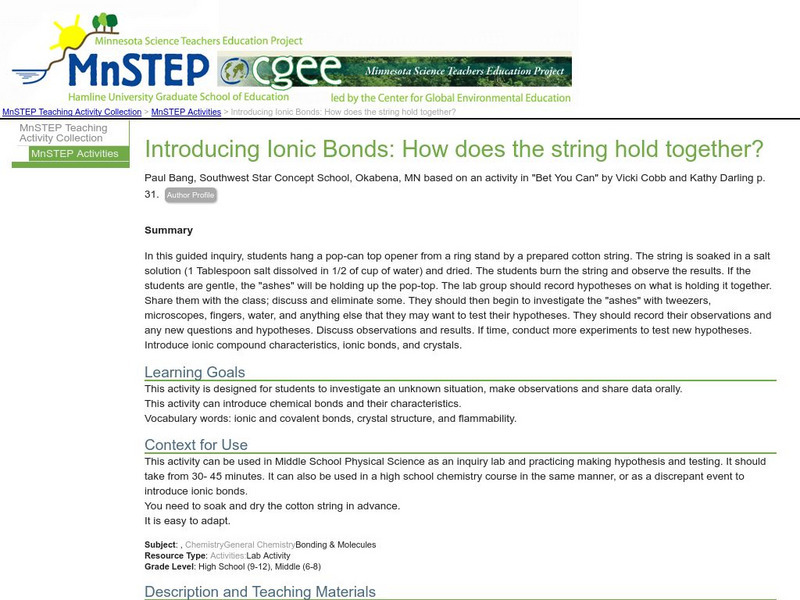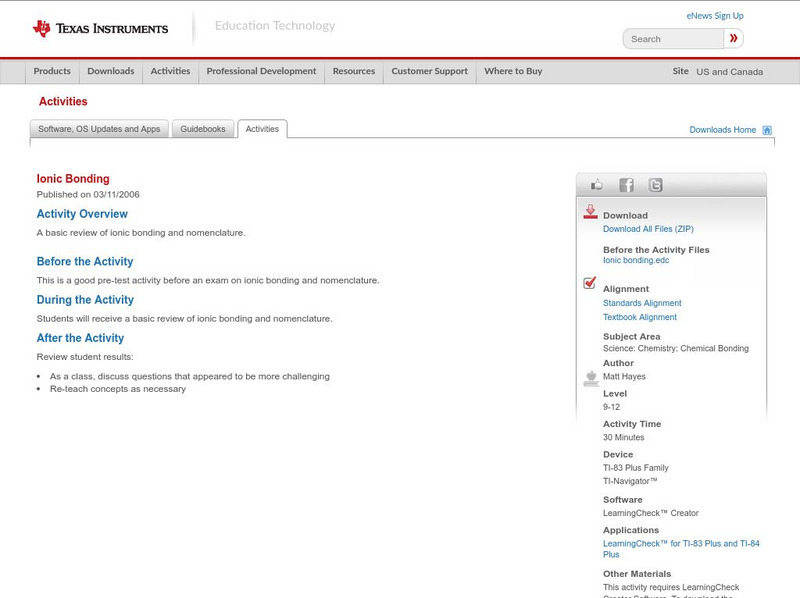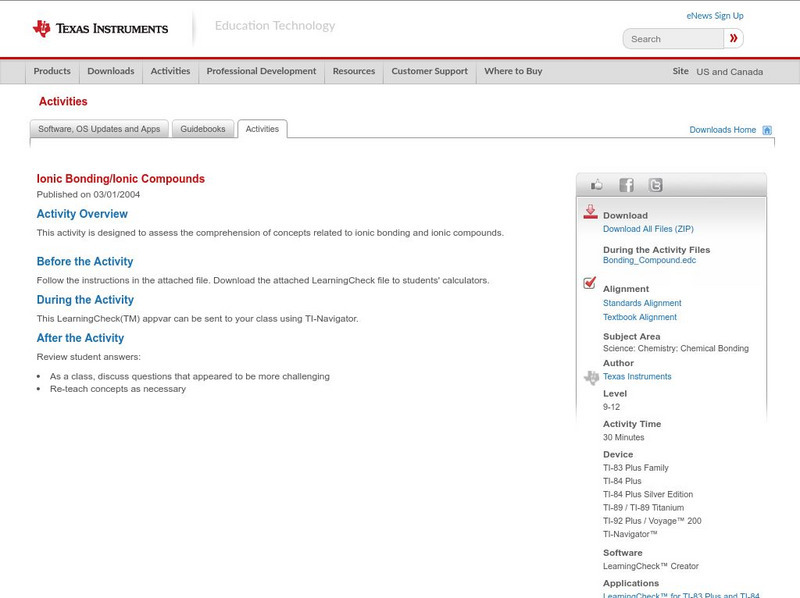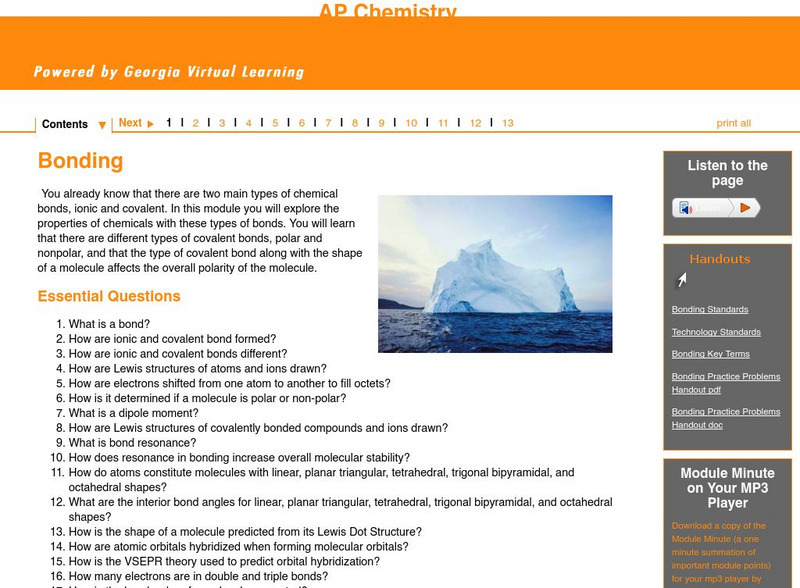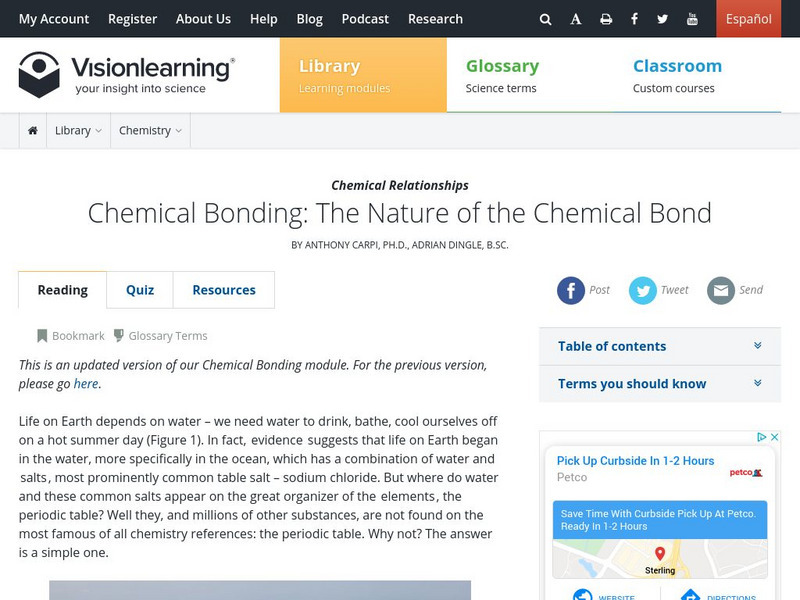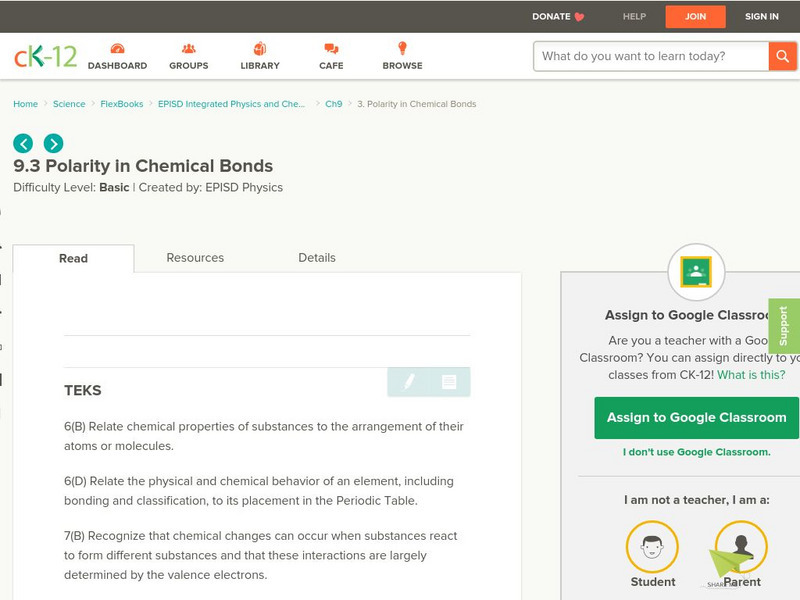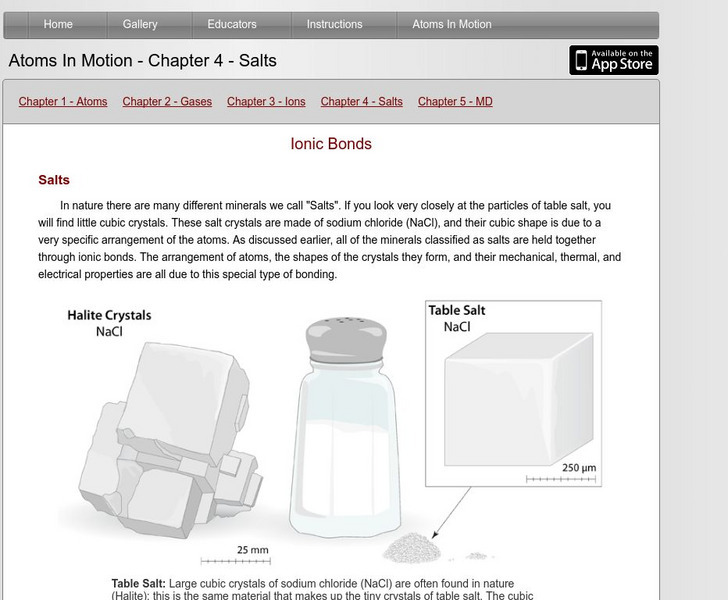CK-12 Foundation
Ck 12: Ionic Bonds and Ionic Compounds
[Free Registration/Login may be required to access all resource tools.] In the following online tutorial students will learn to explain how an ionic bond is formed when electrons are transferred from one atom to another in terms of the...
American Chemical Society
Middle School Chemistry: Energy Levels, Electrons, Ionic Bonding
Students discover that ionic bonding occurs when electrons are transferred from one atom to the other and not shared as in covalent bonding.
Concord Consortium
The Molecular Workbench Database: Ionic Bonds
In this simulation observe ionic bonds and how they affect the structure of the molecule.
Texas Education Agency
Texas Gateway: Ionic Bonds: Electron Dot Formulas
Given descriptions, diagrams, scenarios, or chemical symbols, students will model ionic bonds using electron dot formulas.
CK-12 Foundation
Ck 12: Chemistry: Ionic Bonding
[Free Registration/Login may be required to access all resource tools.] A tutorial about ionic bonding. Learn how and why they form, and the role of energy in their formation.
CK-12 Foundation
Ck 12: Physical Science: Ionic Bonding
[Free Registration/Login may be required to access all resource tools.] Ionic bonds: How and why they form, and the role of energy in their formation.
Sophia Learning
Sophia: Ionic Bonding: Lesson 2
This lesson will define an ionic bond. It is 2 of 3 in the series titled "Ionic Bonding."
CK-12 Foundation
Ck 12: Chemistry: Ionic Bonding
[Free Registration/Login may be required to access all resource tools.] Covers how ions interact with one another in ionic bonds.
CK-12 Foundation
Ck 12: Ionic Bonds and Ionic Compounds
[Free Registration/Login may be required to access all resource tools.] Students will understand the general properties that distinguish ionic compounds from other substances, and predict which elements are likely to form ionic compounds...
Michael Blaber, PhD
Florida State University: Basic Concepts of Chemical Bonding: Ionic Bonding
This tutorial explains the basic concepts of ionic bonding, with a good discussion of lattice energy.
PBS
Pbs Learning Media: Ionic Bonding
A tutorial illustrating ionic bonding. Tutorial explains how and why it occurs with animations and some interactive activities throughout. Explore the bond that forms between sodium and chlorine as you count the number of atoms present.
Science Education Resource Center at Carleton College
Serc: Introducing Ionic Bonds: How Does the String Hold Together?
This inquiry activity introduces chemical and ionic bonds and allows students to investigate an unknown situation, make hypotheses, and share data.
Texas Instruments
Texas Instruments: Ionic Bonding
A basic review of ionic bonding and nomenclature.
Texas Instruments
Texas Instruments: Ionic Bonding/ionic Compounds
This activity is designed to assess the comprehension of concepts related to ionic bonding and ionic compounds.
Khan Academy
Khan Academy: Single and Multiple Covalent Bonds
Explains what covalent bonds are and the difference between them and ionic bonds. Discusses the properties of polar and non-polar covalent bonds, and single and multiple covalent bonds, and gives analogies and examples of how covalent...
Georgia Department of Education
Ga Virtual Learning: Ap Chemistry: Bonding
In this module students explore the properties of chemicals with covalent and ionic bonds. Students learn that there are different types of covalent bonds, polar and nonpolar, and that the type of covalent bond along with the shape of a...
Vision Learning
Visionlearning: Chemistry: The Nature of the Chemical Bond
This site talks about ionic, polar covalent, and non-polar covalent bonding.
CK-12 Foundation
Ck 12: Polarity in Chemical Bonds
[Free Registration/Login may be required to access all resource tools.] Students will determine the polarity of a chemical bond using the electronegativity chart, and then distinguish between nonpolar covalent, polar covalent, and ionic...
American Chemical Society
Middle School Chemistry: Energy Levels, Electrons, and Ionic Bonding
Explore ionic molecular bonds and how electrons and their energy levels come into play.
Science Struck
Science Struck: Characteristics of Ionic Bonding
Explains what chemical bonds are and how they form, the three most common types, and the characteristics of ionic bonds. Gives an example of ionic bonding.
Other
Atoms in Motion: Ionic Bonds
In nature there are many different minerals we call "Salts". If you look very closely at the particles of table salt, you will find little cubic crystals. These salt crystals are made of sodium chloride (NaCl), and their cubic shape is...
Khan Academy
Khan Academy: Biology: Chemistry of Life: Chemical Bonds
Review over covalent, hydrogen, and ionic bonding in this article. Learn how molecules are held together by chemical bonds.
Concord Consortium
Concord Consortium: Stem Resources: Chemical Bonds
By working through this web-based activity, students differentiate between ionic, non-polar covalent, and polar covalent bonds. Specifically, distinctions are made between bonding types based on orbital shapes and electronegativity...
PBS
Pbs Learning Media: Chemical Bonds
This interactive activity developed for Teachers' Domain demonstrates how attractive forces between atoms create chemical bonds, resulting in the formation of molecules and compounds.
Other popular searches
- Covalent and Ionic Bonding
- Chemical Bonding Ionic
- Ionic Bonding Lab
- Practicing the Ionic Bonding
- Labs Ionic Bonding
- Chemistry Ionic Bonding
- Ionic Bonding Nomenclature
- Convalent and Ionic Bonding
- Ionic Bonding Discussion
- Ionic Bonding Lesson Plans
- Ionic Bonding Lesson
- Covalent Ionic Bonding


